by midtowng | 1/10/2009 03:56:00 PM
"The Commune was a turning-point of decisive importance. It stands at the threshold of the modern age of imperialism. The conditions methods and aims of the proletarian revolutionary movement in the age of imperialism were, so to speak, grandly foreshadowed in it."
- V. Lenin
"It was essentially a working class government, the product of the struggle of the producing against the appropriating class, the political form at last discovered under which to work out the economical emancipation of labor.
This was the first revolution in which the working class was openly acknowledged as the only class capable of social initiative, even by the great bulk of the Paris middle class — shopkeepers, tradesmen, merchants — the wealthy capitalist alone excepted."
- K. Marx
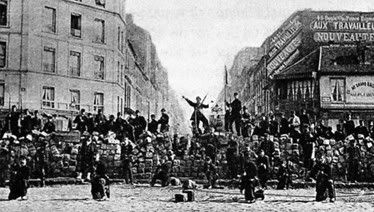
This is the fifth edition of a six part series. You can find part 1, part 2, part 3, and part 4 at the links.
The Commune's Brief Golden Age
The new elected Council of the Commune was drawn from a far more diverse and broad spectrum than the detractors tried to portray. It consisted of 81 members, although good attendance was typically around 60.
35 members of the Commune were manual workers, such as metal workers, carpenters, masons and book-binders. This group mostly got involved in politics through the growing trade union movement. They included Emile Victor Duval, Victor Clement, Camille Langevin, and Augustin Avrial.

Jules Valles
It's difficult, if not impossible to break down the members of the Commune by politics. Blanquists, Jacobins, socialists, Proudhonians, and republicans remain very loose descriptions, and even then do not cover every member.
19 members had been part of the National Guard Central Committee, few of them had been involved in politics before. Only a couple were members of Marx's fledgling International Workingmen's Association.
What exactly was the Paris Commune? Sometimes it was merely a municipal government. Other times it was a sovereign Assembly. It wasn't until near the end, when it was too late, that its role was clear. This confusion was a leading factor in its hesitance to start a civil war against Versailles.
One of the first decrees the Commune made was one of the most important - the remittance of past rents. In these times, the landlord of a tenant that was behind on their bills could legally seize all of the tenants possessions until the back rent was paid. In other words, it was one of the first bankruptcy laws. The remittance of back rent, beginning from the start of the siege, was extremely popular with the lower middle class. Versailles called it a "blow to the rights of property." Just as importantly, it was done with a popular flair.
"The property of the poor is as sacred as that of the rich."
- Communard Arthur Arnould
Another early Commune decree was the distribution of tools held in the national pawn shops back to the tradesmen who needed them to make a living.
While Paris was arranging elections and trying to relieve the burden on its citizens, Versailles was preparing for war. Thiers had kept his army, much of which had been imported from the provinces, isolated from the public. They were given raises, new uniforms, better housing and rations, and underwent constant army drilling and official propaganda.
On Palm Sunday, April 2, two brigades of the army's best men, headed by General Vinoy set off to attack the barricades at Courbevoie. An unfortunate incident happened just before the fighting, when surgeon-general Dr. Pasquier got lost while trying to catch up to his unit and was exposed before the Communard barricades. Mistaking his broad stripes on his shoulder for a colonel, they shot him. It made excellent propaganda for Versailles.
The first attack was driven back under heavy fire by the Communards. But Vinoy rallied the troops and the barricades were taken. In a savage sign of things to come, the army shot most their National Guard prisoners.
The response from Paris was indignation.
"The royalist conspirators have attacked! Despite the moderation of our attitude, they have ATTACKED!"
- Commune bulletin
La Grande Sortie
Up to this point there was a naive belief that if Paris didn't attack Versailles then Versailles wouldn't attack them, as if the ruling class would ever give up their power without a bloody fight. There was an almost universal belief that the federal troops would not fire on their own citizens and cause a civil war. Even after Courbevoie people of the Commune didn't want to believe that regular troops had been involved.
It was these naive assumptions that caused the Commune to not attack Versailles in the days after March 18. It was this denial in the face of facts, this holding to a higher moral standard, that would doom the Commune.
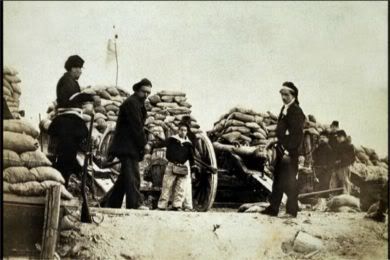
It was a spontaneous explosion of popular anger. Tens of thousands of people were out in the streets looking to avenge the battle of yesterday. Eudes, Duval, and Bergeret all said that "the enthusiasm is irresistible". Calls for delaying the march on Versailles until a battle plan was created and supplies organized went unheeded.
Many of the National Guard considered the whole action a promenade, and even took their women and children along. They were convinced that the army would fraternize rather than fire on the National Guard. The route decided upon took them right under the guns of fort Mont-Valerien.
No one seemed concerned.

When the happy column suddenly found itself under fire, the shock turned quickly into a flight back to Paris for many. Bergeret managed to rally the front of the column and continue the march towards Versailles, where he met up with Flourens' column. Soon they were just four miles from their target.
But then the army rallied and attacked the disorganized group. The march stalled, and then became a rout. Bergeret ordered the retreat.
Flourens got separated from his troops after some accused him of treason. Instead of going back to Paris he dejectedly hid in a stable in Rueil, until he was discovered by army troops. The officer in charge, Captain Desmarets used his sword to kill the unarmed Flourens. Desmarets was decorated when he returned to Versailles. Flourens' body was sent off in a dung cart.
"I declare a war in which there will be neither truce nor mercy upon these assassins. I have had to make an example; let it be salutary."
- General Marquis Gallifet, after shooting Communard prisoners
Duval's men did somewhat better. By nightfall they still held the redoubt at Chatillon. However, by morning they were surrounded, and Duval surrendered his 1,500 men on the promise of their lives.
But the word of a Versailles general was worthless. On the road back to Versailles all ex-soldiers were taken out of line and executed on General Vinoy's orders. When Duval protested, Vinoy had him executed as well.
Captured Communards found little better treatment once they reached Versailles. The lines of prisoners were treated as savages, under the blows of canes and umbrellas. The terms used were "hyenas" and "gorillas". The elegantly dressed women of the ruling class were the most vicious, especially to members of their own sex.
The class divisions were now seen in racialist terms.

Commune prisoners being marched to Versailles
From this point on Versailles dominated the battlefield. The Commune was now on the defensive and would remain so for the rest of its existence. A second siege of Paris would begin in a few days, and it would be much worse than Prussia's.
Before the siege could happen Versailles would need to take the bridge at Neuilly. It took two days of bloody fighting, and Versailles lost two generals in the process, but they eventually overwhelmed the Commune's defenses there.
While this fighting went on, Thiers negotiated with Bismark the speedy return of prisoners of war. Bismark also increased the number of army troops France was allowed to 80,000. Later it was increased to 130,000. Like Thiers, Bismark feared an armed proletariat movement much more than a foreign army under control of the wealthy elite.
- V. Lenin
"It was essentially a working class government, the product of the struggle of the producing against the appropriating class, the political form at last discovered under which to work out the economical emancipation of labor.
This was the first revolution in which the working class was openly acknowledged as the only class capable of social initiative, even by the great bulk of the Paris middle class — shopkeepers, tradesmen, merchants — the wealthy capitalist alone excepted."
- K. Marx

This is the fifth edition of a six part series. You can find part 1, part 2, part 3, and part 4 at the links.
The Commune's Brief Golden Age
The new elected Council of the Commune was drawn from a far more diverse and broad spectrum than the detractors tried to portray. It consisted of 81 members, although good attendance was typically around 60.
| 18 of the members came from middle-class backgrounds, such as Raoul Rigault, Jules Valles, Gustave Tridon, and Charles Beslay. | 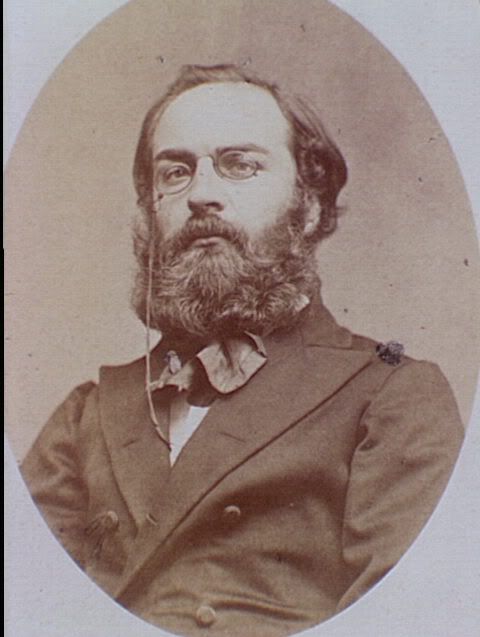 Raoul Rigault |
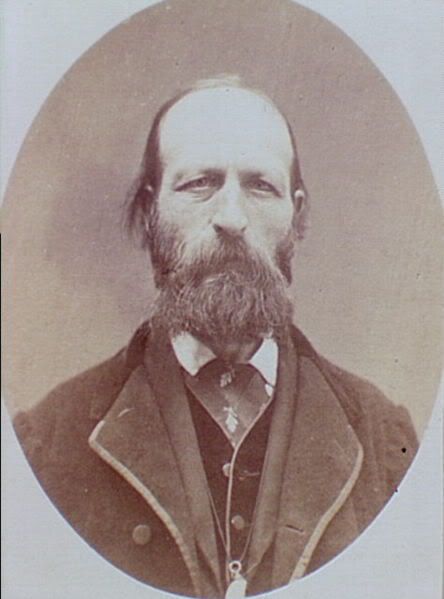 Jules Allix | About 30 of the members could be considered professionals (sometimes called la boheme in those times, and were hated by the bourgeois). They included Francois Jourde and Jules Allix. |
35 members of the Commune were manual workers, such as metal workers, carpenters, masons and book-binders. This group mostly got involved in politics through the growing trade union movement. They included Emile Victor Duval, Victor Clement, Camille Langevin, and Augustin Avrial.

Jules Valles
It's difficult, if not impossible to break down the members of the Commune by politics. Blanquists, Jacobins, socialists, Proudhonians, and republicans remain very loose descriptions, and even then do not cover every member.
19 members had been part of the National Guard Central Committee, few of them had been involved in politics before. Only a couple were members of Marx's fledgling International Workingmen's Association.
What exactly was the Paris Commune? Sometimes it was merely a municipal government. Other times it was a sovereign Assembly. It wasn't until near the end, when it was too late, that its role was clear. This confusion was a leading factor in its hesitance to start a civil war against Versailles.
| "Workers, you have, for the first time, accomplished the revolution by and for labour. Let us not deny and above all do not let us be ashamed of our origins." - General Gustave Cluseret | 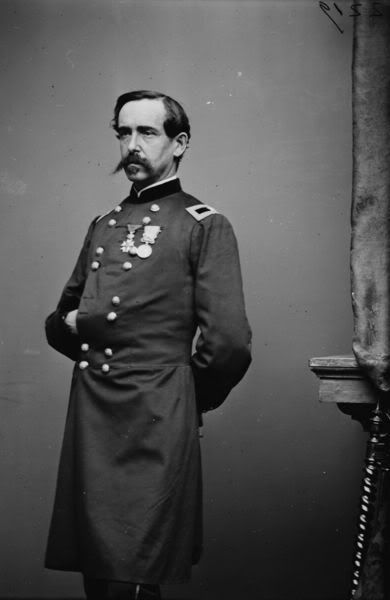 |
One of the first decrees the Commune made was one of the most important - the remittance of past rents. In these times, the landlord of a tenant that was behind on their bills could legally seize all of the tenants possessions until the back rent was paid. In other words, it was one of the first bankruptcy laws. The remittance of back rent, beginning from the start of the siege, was extremely popular with the lower middle class. Versailles called it a "blow to the rights of property." Just as importantly, it was done with a popular flair.
"The property of the poor is as sacred as that of the rich."
- Communard Arthur Arnould
Another early Commune decree was the distribution of tools held in the national pawn shops back to the tradesmen who needed them to make a living.
While Paris was arranging elections and trying to relieve the burden on its citizens, Versailles was preparing for war. Thiers had kept his army, much of which had been imported from the provinces, isolated from the public. They were given raises, new uniforms, better housing and rations, and underwent constant army drilling and official propaganda.
On Palm Sunday, April 2, two brigades of the army's best men, headed by General Vinoy set off to attack the barricades at Courbevoie. An unfortunate incident happened just before the fighting, when surgeon-general Dr. Pasquier got lost while trying to catch up to his unit and was exposed before the Communard barricades. Mistaking his broad stripes on his shoulder for a colonel, they shot him. It made excellent propaganda for Versailles.
The first attack was driven back under heavy fire by the Communards. But Vinoy rallied the troops and the barricades were taken. In a savage sign of things to come, the army shot most their National Guard prisoners.
The response from Paris was indignation.
"The royalist conspirators have attacked! Despite the moderation of our attitude, they have ATTACKED!"
- Commune bulletin
La Grande Sortie
Up to this point there was a naive belief that if Paris didn't attack Versailles then Versailles wouldn't attack them, as if the ruling class would ever give up their power without a bloody fight. There was an almost universal belief that the federal troops would not fire on their own citizens and cause a civil war. Even after Courbevoie people of the Commune didn't want to believe that regular troops had been involved.
It was these naive assumptions that caused the Commune to not attack Versailles in the days after March 18. It was this denial in the face of facts, this holding to a higher moral standard, that would doom the Commune.

It was a spontaneous explosion of popular anger. Tens of thousands of people were out in the streets looking to avenge the battle of yesterday. Eudes, Duval, and Bergeret all said that "the enthusiasm is irresistible". Calls for delaying the march on Versailles until a battle plan was created and supplies organized went unheeded.
Many of the National Guard considered the whole action a promenade, and even took their women and children along. They were convinced that the army would fraternize rather than fire on the National Guard. The route decided upon took them right under the guns of fort Mont-Valerien.
No one seemed concerned.

When the happy column suddenly found itself under fire, the shock turned quickly into a flight back to Paris for many. Bergeret managed to rally the front of the column and continue the march towards Versailles, where he met up with Flourens' column. Soon they were just four miles from their target.
But then the army rallied and attacked the disorganized group. The march stalled, and then became a rout. Bergeret ordered the retreat.
Flourens got separated from his troops after some accused him of treason. Instead of going back to Paris he dejectedly hid in a stable in Rueil, until he was discovered by army troops. The officer in charge, Captain Desmarets used his sword to kill the unarmed Flourens. Desmarets was decorated when he returned to Versailles. Flourens' body was sent off in a dung cart.
"I declare a war in which there will be neither truce nor mercy upon these assassins. I have had to make an example; let it be salutary."
- General Marquis Gallifet, after shooting Communard prisoners
Duval's men did somewhat better. By nightfall they still held the redoubt at Chatillon. However, by morning they were surrounded, and Duval surrendered his 1,500 men on the promise of their lives.
But the word of a Versailles general was worthless. On the road back to Versailles all ex-soldiers were taken out of line and executed on General Vinoy's orders. When Duval protested, Vinoy had him executed as well.
Captured Communards found little better treatment once they reached Versailles. The lines of prisoners were treated as savages, under the blows of canes and umbrellas. The terms used were "hyenas" and "gorillas". The elegantly dressed women of the ruling class were the most vicious, especially to members of their own sex.
The class divisions were now seen in racialist terms.

Commune prisoners being marched to Versailles
From this point on Versailles dominated the battlefield. The Commune was now on the defensive and would remain so for the rest of its existence. A second siege of Paris would begin in a few days, and it would be much worse than Prussia's.
Before the siege could happen Versailles would need to take the bridge at Neuilly. It took two days of bloody fighting, and Versailles lost two generals in the process, but they eventually overwhelmed the Commune's defenses there.
While this fighting went on, Thiers negotiated with Bismark the speedy return of prisoners of war. Bismark also increased the number of army troops France was allowed to 80,000. Later it was increased to 130,000. Like Thiers, Bismark feared an armed proletariat movement much more than a foreign army under control of the wealthy elite.
Labels: La Commune, midtowng




